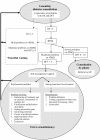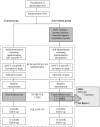Integrating nurse-led Self-Management Support (SMS) in routine primary care: design of a hybrid effectiveness-implementation study among type 2 diabetes patients with problems of daily functioning and emotional distress: a study protocol
- PMID: 23758974
- PMCID: PMC3699365
- DOI: 10.1186/1471-2296-14-77
Integrating nurse-led Self-Management Support (SMS) in routine primary care: design of a hybrid effectiveness-implementation study among type 2 diabetes patients with problems of daily functioning and emotional distress: a study protocol
Abstract
Background: Psychosocial problems are more prevalent among patients with chronic diseases than among the general population. They may lead to a downward spiral of poor adherence, deterioration of the condition and decline in daily functioning. In addition to medical management, systematic attention to emotional and role management tasks during routine chronic care seems mandatory. We intend to integrate an existing nurse-led minimal psychological intervention to support patients' self-management, which appeared to be effective and cost-effective, in routine care by primary care nurses, so we adjusted it to fit the host setting. The resulting Self-Management Support (SMS) programme involves early detection of patients with emotional distress and problems of daily functioning, as well as self-management support through problem solving and reattribution techniques. Strategies to embed SMS in daily practice include training and booster sessions for practice nurses as well as organisational and financial arrangements. This study aims to simultaneously evaluate the implementation process and effects of SMS in routine care, using a hybrid effectiveness-implementation design.
Methods/design: Registration data, questionnaires and interviews will be used to explore the facilitators, barriers and costs regarding successful implementation of SMS. The effects of SMS will be evaluated in a pragmatic cluster-randomised controlled trial with a baseline measurement and follow-up measurements after 4 and 12 months. The population will consist of 46 practice nurses and their type 2 diabetes patients (N = 460; 10 per practice nurse). The practice nurses will be randomly assigned to the intervention or control group. Practice nurses of the intervention group will receive SMS training. Patients for the intervention and control groups will be recruited by a researcher-led self-administered screening procedure to decide which patients of those scheduled for routine consultation are likely to be detected by the practice nurses as eligible for the self-management support. Primary outcome measure is patients' daily functioning. Secondary measures include emotional well-being, participation, autonomy and control over the disease.
Discussion: Our hybrid study design is complicated by the detection method used by the practice nurses. This method is an implementation issue in itself that has consequences for the realisation and power of the effect evaluation.
Trial registration: Current Controlled Trials, NTR2764.
Figures
References
Publication types
MeSH terms
Associated data
LinkOut - more resources
Full Text Sources
Other Literature Sources
Medical



